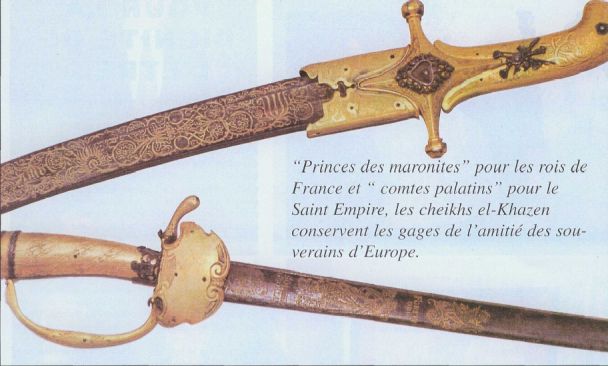
The Saga of el Khazen
Original Author: Eliane Gebara
Introduction
The Khazen family is among the largest and most prestigious Lebanese families. They were Maronites ever since the start and never drifted from the Maronite Church for political gains. Instead, they strengthened their positions in the Maronite community and gained further privileges, most notably by getting appointed as French Consuls since Louis XIV.
The Khazens Consuls of France
Being a Consul of France is not only an honorary position but also has a lot of advantages. In fact and for a long time, silk trade has been the most important constituent of French commerce. In the middle of the 17th century, Lebanese products, particularly yellow silk products from the Maronite district of Keserwan, were high in demand. Other areas that were also known for their silk products included the Druze area of Chouf, Tripoli and Beirut’s yellow and white products.
Consuls were authorized to take 2% on any merchandises shipped to France, add to that 1% surtax. However, a quarrel occurred between the two consuls of France from Saida and Aleppo over the tax distribution whereas Saida’s merchants had to go through several channels to get their products through which left them at a disadvantage. This never-ending byzantine quarrel was finally settled by Abou Nawfal el Khazen, son of Abou-Nader who had inherited the consul position from Emir Melhem who had taken charge after the defeat of his uncle Fakhreddine.
What happened is that Abou Nawfal felt he was more than eligible to be the next consul of France, and thought he should seek recommendations from the Capuchin and Jesuit missionaries, specially that his family had helped them greatly throughout the years. On the 28th of June 1655, French Consul Mr. Picquet named Abou Nawfal vice-consul of France in Beirut granting him all the privileges and honors that come with this position. On the 1st of May 1657, King Louis XIV confirmed his position and thanked him for helping out the missionaries. Added to that, the king dispatched to Abou Nawfal letters that honored Abou Nawfal as being a noble in France and having all the rights that come along with this title.
He also got the right to buy and own houses and buildings in France and all the privileges associated to a French citizen, since the nobility could only be associated to a French citizen. Added to that, not only did Abou Nawfal get all these privileges, but King Louis XIV allowed him to pass it to his sons and successors. However Abou Nawfal’s enjoyment over this achievement was shortly lived as King Louis XVI annulled the letters sent by his predecessor and withdrew all the privileges assigned to the Khazen family after being pressured by Saida’s merchants. He also ordered to separate Beyrouth from Aleppo and joined Saida to the latter. Abou Nawfal did not take this setback well and retaliated by asking the Maronite Patriarch to intervene. As a result, Mgr Isaac Chedraoui was dispatched to France with recommendations from the pope, the Capuchin and Jesuits who were very powerful at the time in Versailles. This led King Louis XVI not only to come back from his decision, but name Abou Nawfal on the 1st of January 1662 as a consul of France and give Beirut a separate status aside from Saida and Aleppo.
In order to celebrate the happy news, Abou-Nawfal united his family and friends and headed to the Beirut Church where they read the letters of the King of France before Mgr Chedraoui blessed the newly appointed consul’s coat. On the 9th of june 1675, Abou-Nawfal was also named consul of Italy and he fulfilled both his duties as consul of France and Italy until his death on the 13th of August 1679. It was his son Cheikh Fayad, known as Abou-Kanso, who took after him until he died on the 17th of October 1691. At the time, the Vatican gave them the prestigious title of Princes of the Church. Abou-Kanso was succeeded by his sons Hosn from 1697 till 1707 and Nawfal, known as Abou-Nassif, from 1708 till 1753. Abou-Nassif’s term was troubled by the death of Louis XIV in 1715, whereas he wasn’t able to fulfill his tasks properly and awaited provision letters from the new French authorities, which did not happen. The pretext was that appointing a consul of France requires that he’d be born in France but the truth was the Chehabs rise to power made them favorites over the Khazens in the eyes of Louis XVI who did not hesitate to appoint Ghandour es-Saad, a chancellor of Emir Youssef Chehab, as a consul of France.
On a final note, and under Henri the fourth’s rule, el-Khazen’s Cheikh was the most powerful member of the Christian community, mainly the Maronite one. He was the only one capable of rivaling with the Ottoman authorities and the Muslim Emirs. The Khazens were living as nobles ever since the 15th century and the proof is found through a testimony in one of the gospels at the time.



